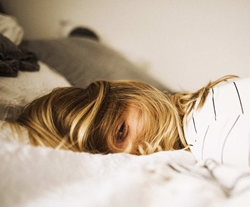Taylor Leamey* says if you’re sleeping enough but still feeling tired, you’re not getting quality sleep.
 Most of us think that getting 8 hours of sleep is enough to feel energized.
Most of us think that getting 8 hours of sleep is enough to feel energized.
We focus so much on the number of hours we’re sleeping and not focusing enough on how we feel when we wake up.
You can sleep for the recommended amount and still not feel rested.
That’s because quantity isn’t the only factor that matters — it’s also about the quality of sleep you get.
Getting the right type of sleep can be a complicated topic.
We’ll take you through what restful sleep is, why it’s important and how to tell whether you’re getting it.
Plus, here’s how to sleep cooler even without air conditioning, our guide to natural sleep aids, and our ultimate sleep hack.
What we mean by quality sleep
Our bodies go through four stages of sleep, during which our body temperature changes and our breathing starts to slow.
The stages of sleep are divided into two parts: REM sleep and non-REM sleep.
Stages one through three are non-REM sleep, and stage four is REM sleep.
Deep sleep, also known as “slow wave sleep,” is the final stage of non-REM sleep.
We spend most of our time in deep sleep during the first half of a night.
The segments of deep sleep shorten each time we cycle through the sleep stages.
Deep sleep accounts for 13 per cent to 23 per cent of nightly sleep.
During deep sleep, your heartbeat and breathing slow down as your muscles relax.
Brain waves are also slow during deep sleep.
Experts suggest deep sleep is essential for restorative sleep and promotes recovery and growth.
Disrupting these cycles reduces the quality of sleep you’re getting — even if you are asleep for 8 hours.
Not getting enough deep sleep and REM sleep can affect your ability to function.
Signs you aren’t getting restful sleep
Understandably, it’s hard to determine what type of sleep you’re getting…
when you’re asleep.
However, there are tell-tale behavioural signs that you aren’t getting restful sleep.
Here are the most common.
- You wake up and feel exhausted:
If you’re not getting enough deep sleep, you’ll feel exhausted, no matter how much you sleep.
This is the most common way to tell if your sleep may be the problem.
- You’re irritable:
We all have waves of frustration or annoyance.
When you’re sleep-deprived, things that wouldn’t usually bother you get under your skin.
If you’re unusually quick to anger but seem to be getting more annoyed or annoyed faster than normal, you’re likely not well rested.
- You can’t concentrate on things:
When you’re not getting the right kind of sleep, your ability to concentrate and stay alert is lower.
- Your memory is worse:
There are several types of memory; our working memory is the temporary information we hold in our mind and use to execute cognitive tasks.
Sleep deprivation makes it more difficult to complete these tasks without errors.
- You’re taking more naps than normal:
Whether they’re planned naps or you drift off while watching TV, if you’re falling asleep out of sequence during the day, you’re not getting enough sleep at night.
Should you track your sleep?
If you’re not tracking your sleep, you should probably start — especially if you suspect you’re not getting enough of the right kind of sleep at night.
Tracking your sleep will give you insights into how much sleep you’re getting, the type of sleep, and the time spent awake.
It even can track your heart and breathing rate.
This gives you the ability to assess your habits and identify patterns.
When it comes to the world of sleep trackers, there are a lot of options.
The most popular are watches, but there are sleep rings, apps and even mattress sleep trackers that lay across your mattress.
You don’t have to break the bank to track your sleep with varying price points.
Long story short, using some sort of sleep tracker is a good idea for most people.
Using tech to track your sleep can help ensure you get the right type of sleep for the right duration.
It can also help you reduce stress or change your nightly routine to promote sleep.
For more help improving your sleep, Fall Asleep Faster by Doing This Thing Right Before Bed or the best natural aids for insomnia.
*Taylor Leamey writes about all things wellness, specializing in mental health, sleep and nutrition coverage. She has invested hundreds of hours into studying and researching sleep and holds a Certified Sleep Science Coach certification from the Spencer Institute.
This article first appeared at cnet.com











